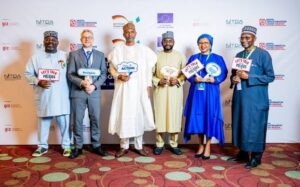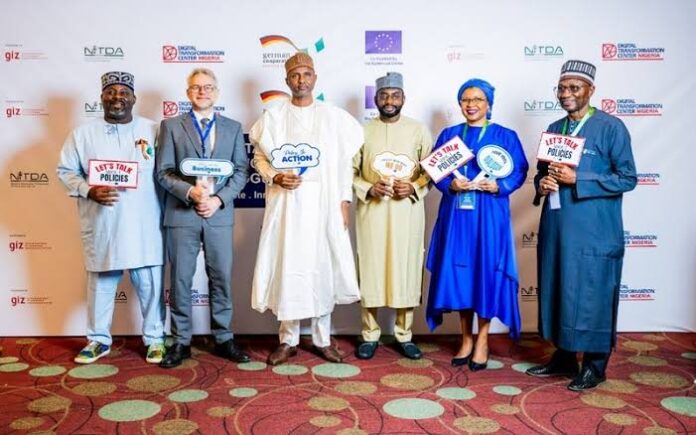The National Information Technology Development Agency (NITDA), in partnership with the Digital Transformation Center (DTC) Nigeria and Deutsche Gesellschaft für Internationale Zusammenarbeit (GIZ), recently hosted a two-day event aimed at improving citizen involvement in digital policy-making.
The event, titled “Digital Policy Dialogue: Cooperate. Innovate,” focused on the Participatory Policy Implementation Framework (PPIF) designed to enhance collaboration between the Nigerian government and its citizens.

During the event, NITDA Director General Kashifu Inuwa emphasized the importance of involving citizens in both the development and implementation of policies. He highlighted a significant shift in NITDA’s approach over the past five years. Previously, NITDA faced criticism for top-down policy impositions. In response, the agency has embraced a more collaborative model, prioritizing co-design and co-creation of policies.
Inuwa expressed gratitude for GIZ’s support, noting that it played a crucial role in the creation of the Nigerian Startup Act and the National Digital Literacy Framework (NDLF). These efforts have increased citizen engagement, with the creative sector actively supporting digital literacy initiatives.
NITDA is also working with the National Youth Service Corps (NYSC) to train citizens in digital skills across Nigeria and is partnering with the Ministry of Education to integrate digital skills into the national curriculum by next year. This aligns with the Ministry of Communication, Innovation and Digital Economy’s goal to achieve 95% digital literacy by 2030 and 70% by 2027.
The PPIF aims to foster greater inclusivity in policy-making by incorporating feedback from a broad range of stakeholders, including the public and various sectors such as education, agriculture, and healthcare. The framework’s goals include establishing multi-channel stakeholder engagement, promoting collaborative decision-making through digital platforms, and ensuring transparency and accountability.
Engineer Faruk Yusuf Yabo, Permanent Secretary of the Ministry of Communications, Innovations, and Digital Economy, underscored the PPIF’s objectives. He highlighted key initiatives such as enhancing stakeholder engagement, fostering collaborative decision-making, and implementing effective monitoring and evaluation mechanisms. Yabo noted that the approach is intended to ensure that the benefits of technological advancements are equitably distributed.
The initiative also has backing from the European Union and the German government, reflecting a commitment to inclusivity and transparency in Nigeria’s digital policy development.
Dr. Markus Wauschkuhn, Coordinator of the Sustainable Economic Development Cluster (SEDEC) at GIZ, praised the collaborative efforts in developing the PPIF. He stressed the importance of a participatory approach to policy-making that involves diverse voices from individuals, communities, businesses, and institutions. This approach aims to enhance transparency, accountability, and trust in governance while addressing the rapid pace of digital advancements.
Dr. Thwueba Dwani, Head of DTC Nigeria, noted that involving stakeholders in policy implementation is key to ensuring sustainability and relevance. She introduced the PPIF as a vital tool for Nigeria’s digital innovation ecosystem, developed through extensive stakeholder engagement.
Other agencies participating in the event included the National Council for Arts and Culture (NCAC), the Small and Medium Enterprises Development Agency of Nigeria (SMEDAN), the National Office for Technology Acquisition and Promotion (NOTAP), civil society organizations, and various private sector representatives.
This digital policy dialogue marks a significant step toward more inclusive and transparent policy-making in Nigeria, setting a precedent for future initiatives in the digital age.




